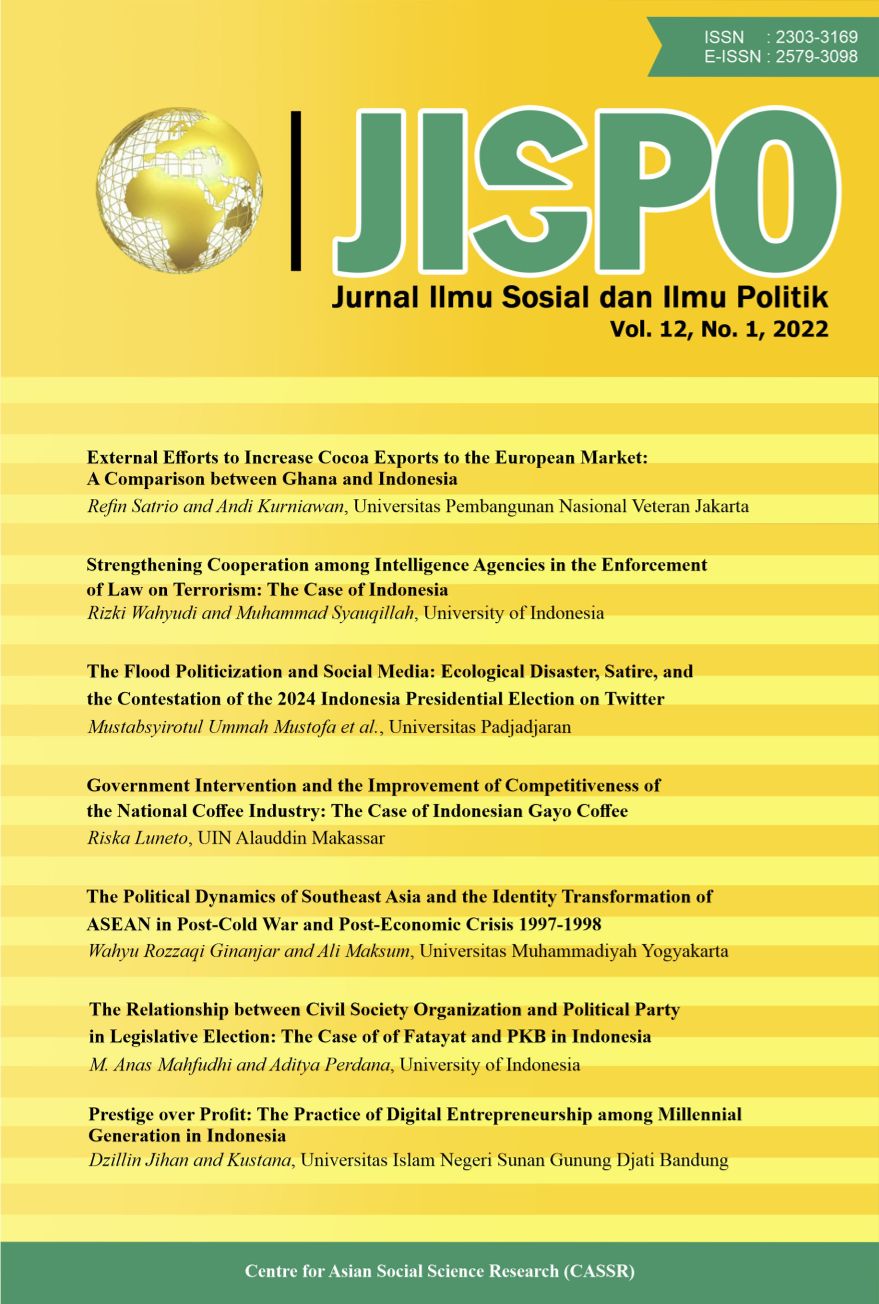Strengthening Cooperation among Intelligence Agencies in the Enforcement of Law on Terrorism: The Case of Indonesia
DOI:
https://doi.org/10.15575/jispo.v12i1.14370Abstract
The development of global, regional and national situations related to terrorism is dynamic and complex affecting national stability and security. It requires optimal and effective action from the government. The complexity of counter-terrorism requires the synergy of all parties. Strengthening cooperation between intelligence agencies can solve the current threat of terrorism. This article aims to propose intelligence cooperation and present the concept of intelligence synergy within the framework of law enforcement in combating terrorism in Indonesia. The article is descriptive qualitative research. It employs in-depth interviews and literature study as a data-gathering technique. Using collaborative governance theory, the article argues that to realize synergy between intelligence agencies, all Indonesian intelligence agencies need to conduct joint action procedures and hold joint terrorism countermeasures exercises, and related activities aimed at creating a common perception and eliminating rivalry among the agencies.
References
Adikara, Ahmad P. B., Muhammad Luthfi Zuhdi, and Wawan Hari Purwanto. 2021. “Analisis Metode Penggalangan Intelijen Dalam Penerapan Program Deradikalisasi oleh BNPT.†SOCIA: Jurnal Ilmu-Ilmu Sosial 18(1): 61–71.
Agranoff Robert and Michael Mcguire, M. 2003. Collaborative Public Management: New Strategies for Local Governments. Washington, DC: Georgetown University Press.
Ansell, Chris and Alison Gash. 2007. “Collaborative Governance in Theory and Practice.†Journal of Public Administration Research and Theory: J-PART 18(4): 543–571.
Araf, Al. 2015. “Menjaga Keseimbangan Antara Keamanan dan Kebebasan dalam Kebijakan Penanggulangan Terorisme.†Jurnal Keamanan Nasional 1(2): 225-249.
Bomantama, Rizal. 2018. “Menhan: Ada Upaya Pindahkan Marawi ke Indonesia.†Retrieved January 8, 2022 (https://www.tribunnews.com/nasional/2018/05/14/menhan-ada-upaya-pindahkan-marawi-ke-indonesia).
Egeham, Lizsa. 2018. “Melongok Sel Canggih Napi Terorisme di Nusakambangan.†Retrieved January 8, 2022 (https://www.liputan6.com/news/read/3521287/melongok-sel-canggih-napi-terorisme-di-nusakambangan).
Halim, Devina. 2019. “Pimpinan Jaringan Teroris Bandung Diduga Terlibat Kasus Bom Surabaya dan Polres Surakarta.†Retrieved January 10, 2022 (https://nasional.kompas.com/read/2019/04/02/14333601/pimpinan-jaringan-teroris-bandung-diduga-terlibat-kasus-bom-surabaya-dan-polres-surakarta).
Hulnick, Arthur S. 2005. “Indications and Warning for Homeland Security: Seeking a New Paradigm.†International Journal of Intelligence and CounterIntelligence 18(4): 593–608.
Jordan, Ray. 2018. “Wakapolri: Rutan di Mako Brimob Tanggung Jawab Kemenkumham.†Retrieved January 8, 2022 (https://news.detik.com/berita/d-4014268/wakapolri-rutan-di-mako-brimob-tanggung-jawab-kemenkum-ham).
Junaidi. 2015. “Collaborative Governance dalam Upaya Menyelesaikan Krisis Listrik di Kota Tanjungpinang.†Retrieved January 8, 2022 (http://jurnal.umrah.ac.id/wp-content/uploads/gravity_forms/1-ec61c9cb232a03a96d0947c6478e525e/2016/08/jurnal-1.pdf).
Karnavian, Tito. 2017. “Tito Akui Lone Wolf Sulit Dideteksi.†Retrieved January 11, 2022 (https://www.jpnn.com/news/tito-akui-lone-wolf-sulit-dideteksi?page=1).
Kreitner, Robert and Angelo Kinicki. 2005. Perilaku Organisasi (Organizational Behavior). Jakarta: Salemba Empat.
Mahyudin, Emil. 2016. “Tantangan Intelijen dalam Kontra-Terorisme di Indonesia: Suatu Pandangan.†Intermestic: Journal of International Studies 1(1): 23-35.
Manullang, A. C. 2006. Terorisme & perang intelijen: Dugaan tanpa bukti = behauptung ohne beweis. Jakarta: Manna Zaitun.
Pedrason, Rodon. 2018. “Intelijen dan Lingkungan Strategis.†Retrieved January 11, 2022 (https://stin.ac.id/jurnal/download.php?file=20190228INTELIJEN%20DAN%20LINGKUNGAN%20 STRATEGIS.pdf).
Ramelan, Prayitno. 2017. Ancaman Virus Terorisme: Jejak Teror di Dunia dan Indonesia. Jakarta: PT. Grasindo.
Reksoprodjo, Agus, Pujo Widodo, and Fauzia Gustarina Cempaka. 2018. “Pemetaan Latar Belakang Dan Motif Pelaku Tindak Kejahatan Terorisme di Indonesia.†Jurnal Prodi Peperangan Asimetris 4(2): 1–20.
Riyanta, Stanislaus. 2015. “Peran Intelijen dalam Penanggulangan Terorisme di Indonesia.†Retrieved December 10, 2021 (https://jurnalintelijen.net/2015/07/06/peran-intelijen-dalam-penanggulangan-terorisme-di-indonesia/).
Riyanta, Stanislaus, Amy Y.S. Rahayu, and Benny J. Mamoto. 2021. “Collaborative Governance in the Terrorist Rehabilitation Programme in Indonesia.†in Civil Society Organizations Against Terrorism: Case Studies from Asia. London: Routledge.
Satrio, Arie Dwi. 2018. “Rutan Mako Brimob Tanggung Jawab Siapa?†Retrieved December 10, 2021 (https://nasional.okezone.com/read/2018/05/12/337/1897380/rutan-mako-brimob-tanggung-jawab-siapa).
Soegirman, Supono. 2012. Intelijen: Profesi Unik Orang-Orang Aneh. Jakarta: Media Bangsa.
Sugiyono. 2017. Metode Penelitian Kuantitatif, Kualitatif, dan R&D. Bandung: Alfabeta.
Suharmono, Munip. 2020. Kontribusi Intelijen TNI Dalam Mencegah Ancaman Terorisme Global di Indonesia. Bandung: Universitas Padjajaran.
Suhayati, Monika. 2016. “Bom Solo dan Penguatan Legislasi Pencegahan Aksi Terorisme.†Retrieved December 9, 2021 (https://berkas.dpr.go.id/puslit/files/info_singkat/Info%20Singkat-VIII-13-I-P3DI-Juli-2016-72.pdf).
Triskaputri, Rifana Meika. 2019. “Pelibatan Militer Dalam Upaya Penanggulangan Terorisme di Indonesiaâ€. Journal of Terrorism Studies 1(1): 61-74. Retrieved December 9, 2021 (https://doi.org/10.7454/jts.v1i1.1005).
Undang-Undang Republik Indonesia Nomor 17 Tahun 2011 tentang Intelijen Negara.
Undang-Undang Republik Indonesia Nomor 5 Tahun 2018 tentang Pemberantasan Tindak Pidana Terorisme.
Wells, Tom and Mike Sullivan. 2017. “British Born Bombers: SAS storm the Manchester home of terror killer Salman Abedi, 22, who lived with his mum and ‘chanted Islamic prayers in the streetâ€. Retrieved December 10, 2021 (https://www.thesun.co.uk/news/3628631/sas-salman-abedi-manchester-killer/).
Widjajanto, Andi, Makmur Keliat, and Cornelis Lay. 2006. Intelijen: Velox et Exactus. Jakarta: Kemitraan Partnership.
Yani, Yanyan M. and Ian Montratama. 2016. “Mengenal Dewan Keamanan Nasional di Empat Negara sebagai Referensi Pembentukan Struktur Koordinasi Penanganan Terorisme di Indonesia.†Jurnal Pertahanan 6 (1): 1-29.
Yuliawati, Lis. 2016. “Kronologi Polisi Salah Tembak TNI Satgas Tinombala di Poso.†Retrieved January 9, 2022 (https://www.viva.co.id/berita/nasional/801971-kronologi-polisi-salah-tembak-tni-satgas-tinombala-di-poso?page=all&utm_medium=all-page).
Yunanto, Sri, Angel Damayanti, Siti Merida, and Sidratahta Mukhtar. 2015. “Peranan Berbagai Institusi Keamananâ€. Jakarta: Center for Security and Foreign Affair Studies (CESFAS) Universitas Kristern Indonesia. Retrieved January 10, 2022 (http://repository.uki.ac.id/438/1/Peranan%20Berbagai%20Institusi%20Keamanan.pdf)
Zulfikar, Muhammad and Aminah. 2020. “Peran Badan Nasional Penanggulangan Terorisme Dalam Pemberantasan Terorisme di Indonesiaâ€. Jurnal Pembangunan Hukum Indonesia 2(1): 129–144. Retrieved January 8, 2022 (https://doi.org/10.14710/jphi.v2i1.129-144).
Downloads
Published
How to Cite
Issue
Section
License
Authors who publish their manuscripts in JISPO agree to the following terms:
- Authors retain copyright and grant the journal right of first publication with the work simultaneously licensed under a Creative Commons Attribution-ShareAlike 4.0 International License that allows others to share the work with an acknowledgment of the work's authorship and initial publication in this journal;
- Authors are able to enter into separate, additional contractual arrangements for the non-exclusive distribution of the journal's published version of the work (e.g., post it to an institutional repository or publish it in a book), with an acknowledgment of its initial publication in this journal; and
- Authors are permitted and encouraged to post their work online (e.g., in institutional repositories or on their websites) after publication process, or prior to and during the submission process, as it can lead to productive exchanges, as well as earlier and greater citation of published work (See The Effect of Open Access).


